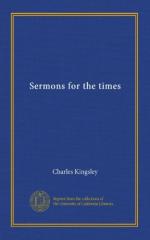And now people are raising the cry that Popery is about to overrun England. It may be so, my friends. If it is so, I cannot wonder at it; if it is so, Englishmen have no one to blame but themselves. And whether Popery conquers us or not, some other base superstition surely will conquer us if we go on upon our present course, and set up any new-fangled, self-invented righteousness of our own, instead of the plain Ten Commandments of God. For I tell you plainly they are God’s everlasting law, the very law of liberty, wherewith Christ has made us free; and only by fulfilling them, as Christ did, can we be free—free from sin, the world, the flesh, and the Devil. For to break them is to sin: and whosoever commits sin is the slave of sin; and whosoever despises these commandments will never enjoy that freedom, but be entangled again in the yoke of bondage, and become a slave, if not to open and profligate sins, still surely to an evil and tormenting conscience, to superstitious anxieties as to whether he shall be saved or damned, which make him at last ask, ’Wherewithal shall I come before the Lord? Will the Lord be pleased with this, that and the other fantastical action, or great sacrifice of mine?’ or at last, perhaps, the old question, ’Shall I give my firstborn for my transgression, the fruit of my body for the sin of my soul? Shall I cheat my own family, leave my property away from my children, desert them to shut myself up in a convent, or to attempt some great religious enterprise?’—Things which have happened a thousand times already, and worse, far worse, than them; things which will happen again, and worse, far worse than them, as soon as a hypocritical generation is seized with that dread and terror of God which is sure to arise in the hearts of men who try to invent a righteousness of their own, and who forget what God’s righteousness is like, and who therefore forget what God is like, and who therefore forget what God’s name is, and who therefore forget that Jesus Christ is God’s likeness, and that the name of God is ‘Love.’
Now, I say that the Church Catechism, from beginning to end, is the cure for this poison, and in no part more than where it tells us our duty to God and our neighbour; and that it does carry out the meaning of the text as no other writing does, which I know of, save the Bible only.
For what says the text?
‘He hath showed thee, O man, what is good.’
Who has showed thee? Who but this very God, from whom thou art shrinking; to whom thou art looking up in terror, as at a hard taskmaster, reaping where He has not sown, who willeth the death of a sinner, and his endless and unspeakable torment? The very God whom thou dreadest has stooped to save and teach thee. He hath sent His only begotten Son to thee, to show thee, in the person of a man, Jesus Christ, what a perfect man is, and what He requires of thee to be. This Lord Jesus is with thee, to teach thee to live by faith in thy heavenly Father,




